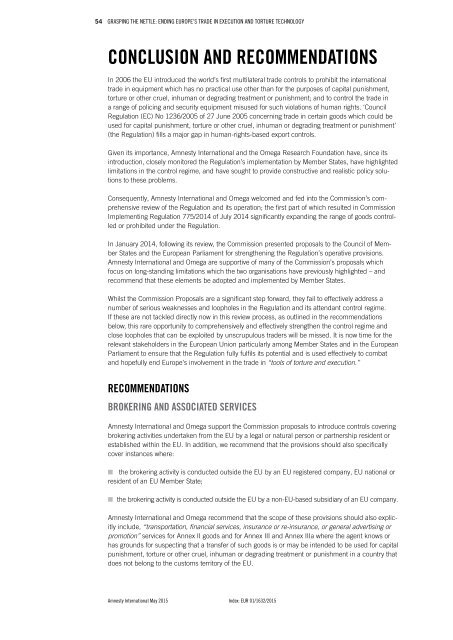Grasping the nettle
1Gsbbd6
1Gsbbd6
You also want an ePaper? Increase the reach of your titles
YUMPU automatically turns print PDFs into web optimized ePapers that Google loves.
54 <strong>Grasping</strong> <strong>the</strong> <strong>nettle</strong>: Ending Europe’s Trade in Execution and Torture Technology<br />
Conclusion and recommendations<br />
In 2006 <strong>the</strong> EU introduced <strong>the</strong> world’s first multilateral trade controls to prohibit <strong>the</strong> international<br />
trade in equipment which has no practical use o<strong>the</strong>r than for <strong>the</strong> purposes of capital punishment,<br />
torture or o<strong>the</strong>r cruel, inhuman or degrading treatment or punishment; and to control <strong>the</strong> trade in<br />
a range of policing and security equipment misused for such violations of human rights. ‘Council<br />
Regulation (EC) No 1236/2005 of 27 June 2005 concerning trade in certain goods which could be<br />
used for capital punishment, torture or o<strong>the</strong>r cruel, inhuman or degrading treatment or punishment’<br />
(<strong>the</strong> Regulation) fills a major gap in human-rights-based export controls.<br />
Given its importance, Amnesty International and <strong>the</strong> Omega Research Foundation have, since its<br />
introduction, closely monitored <strong>the</strong> Regulation’s implementation by Member States, have highlighted<br />
limitations in <strong>the</strong> control regime, and have sought to provide constructive and realistic policy solutions<br />
to <strong>the</strong>se problems.<br />
Consequently, Amnesty International and Omega welcomed and fed into <strong>the</strong> Commission’s comprehensive<br />
review of <strong>the</strong> Regulation and its operation; <strong>the</strong> first part of which resulted in Commission<br />
Implementing Regulation 775/2014 of July 2014 significantly expanding <strong>the</strong> range of goods controlled<br />
or prohibited under <strong>the</strong> Regulation.<br />
In January 2014, following its review, <strong>the</strong> Commission presented proposals to <strong>the</strong> Council of Member<br />
States and <strong>the</strong> European Parliament for streng<strong>the</strong>ning <strong>the</strong> Regulation’s operative provisions.<br />
Amnesty International and Omega are supportive of many of <strong>the</strong> Commission’s proposals which<br />
focus on long-standing limitations which <strong>the</strong> two organisations have previously highlighted – and<br />
recommend that <strong>the</strong>se elements be adopted and implemented by Member States.<br />
Whilst <strong>the</strong> Commission Proposals are a significant step forward, <strong>the</strong>y fail to effectively address a<br />
number of serious weaknesses and loopholes in <strong>the</strong> Regulation and its attendant control regime.<br />
If <strong>the</strong>se are not tackled directly now in this review process, as outlined in <strong>the</strong> recommendations<br />
below, this rare opportunity to comprehensively and effectively streng<strong>the</strong>n <strong>the</strong> control regime and<br />
close loopholes that can be exploited by unscrupulous traders will be missed. It is now time for <strong>the</strong><br />
relevant stakeholders in <strong>the</strong> European Union particularly among Member States and in <strong>the</strong> European<br />
Parliament to ensure that <strong>the</strong> Regulation fully fulfils its potential and is used effectively to combat<br />
and hopefully end Europe’s involvement in <strong>the</strong> trade in “tools of torture and execution.”<br />
Recommendations<br />
Brokering and associated services<br />
Amnesty International and Omega support <strong>the</strong> Commission proposals to introduce controls covering<br />
brokering activities undertaken from <strong>the</strong> EU by a legal or natural person or partnership resident or<br />
established within <strong>the</strong> EU. In addition, we recommend that <strong>the</strong> provisions should also specifically<br />
cover instances where:<br />
n <strong>the</strong> brokering activity is conducted outside <strong>the</strong> EU by an EU registered company, EU national or<br />
resident of an EU Member State;<br />
n <strong>the</strong> brokering activity is conducted outside <strong>the</strong> EU by a non-EU-based subsidiary of an EU company.<br />
Amnesty International and Omega recommend that <strong>the</strong> scope of <strong>the</strong>se provisions should also explicitly<br />
include, “transportation, financial services, insurance or re-insurance, or general advertising or<br />
promotion” services for Annex II goods and for Annex III and Annex IIIa where <strong>the</strong> agent knows or<br />
has grounds for suspecting that a transfer of such goods is or may be intended to be used for capital<br />
punishment, torture or o<strong>the</strong>r cruel, inhuman or degrading treatment or punishment in a country that<br />
does not belong to <strong>the</strong> customs territory of <strong>the</strong> EU.<br />
Amnesty International May 2015 Index: EUR 01/1632/2015


